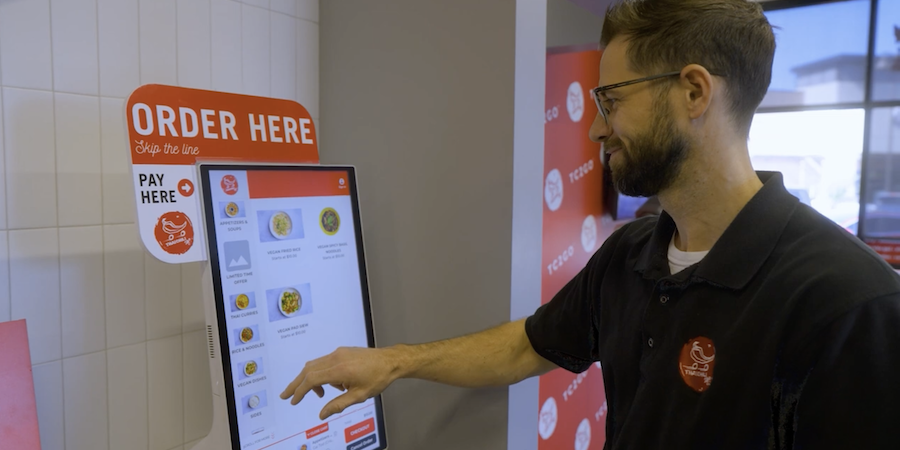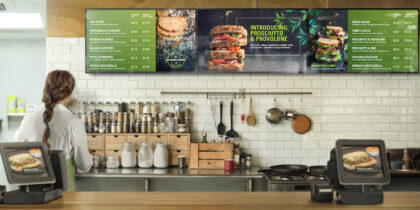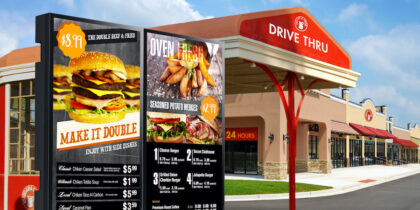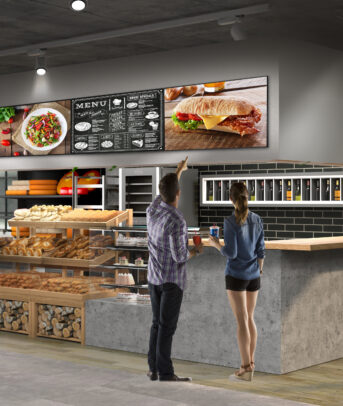Today, self-service is woven into the fabric of daily life for consumers, be it at the supermarket, quick-service restaurant (QSR), bank, museum or sports arena. The reasons are many, but all start with enhancing the customer experience. Self-service kiosks allow consumers to avoid long checkout lines and speed up purchases. The technology also improves order accuracy and enables personalized services.
For businesses, the benefits of self-service kiosks include flexibility of use, larger basket sizes, cost savings and improved efficiency. That makes self-service technology an increasingly important part of digital transformation and a way to meet the growing customer demand for convenience and personalization.
As a result, self-service solutions like Samsung Kiosk can play a key role in driving business profitability to consumer satisfaction. Here’s how.
Consumers prefer self-service experiences
Consumers are used to self-service experiences now — and many prefer it. In fact, 84% of Americans like using self-service kiosks, and 66% would choose kiosks over a human-run checkout, according to a 2024 survey by PlayUSA. The reasons are revealing, too. Of the 1,001 people surveyed, 71% said self-service kiosks and mobile apps offer faster checkouts than human-run checkouts, and 60% use self-service kiosks and mobile apps, so they don’t have to talk to people.
Self-service technology improves personalization, too, further aligning with consumer trends. For example, diners at QSRs can browse and order from a self-service kiosk at their own pace without the pressure of an employee waiting for their order. Self-service kiosks at restaurants and retail stores also allow customers to access their loyalty program, so they can view and redeem rewards and earn points directly through the kiosk interface. At hotels, a self-service kiosk can greet guests in their native language, check them in, and suggest hotel amenities, such as room service, fitness centers, and poolside cabanas.
The treasure trove of data these self-service solutions harvest can strengthen this personalization even more by targeting promotions and adjusting operations according to individual consumer preferences — increasing the success of an upsell and return on investment.
Who can benefit from a self-service kiosk?
One of the chief features of Samsung Kiosk is its flexibility, which allows it to be used in various industries.
Restaurant kiosk systems
Kiosks can solve a variety of challenges for restaurants. Not only do they address the problem of waiting in line, but they can also increase profits. Kiosks never forget to upsell or promote new menu items and limited-time offers, which can boost basket sizes. They can also tie into the menu board, making it easy to daypart and update content on the fly.
In arenas and sports complexes, guests can order and pay from a kiosk in the food court and then walk to the restaurant stall to pick up their food. And in a company cafeteria or break room, diners can scan their food items and be on their way.
Hospitality self-check-in
If you’ve ever tried to check in to a busy hotel or resort, you know it can take a while — even if you’re part of the loyalty program. Kiosks allow guests to check in with ease after a long flight or drive, often when it’s most appreciated.
Just like in restaurants, there is a huge opportunity for upsells here. If given the opportunity to check in at their leisure, guests might add spa services, breakfast, activities or room upgrades. Kiosks can also assist guests with concierge-related queries such as nearby restaurants, activities and landmarks, boosting partnerships between hotels and local businesses.
Retail kiosks
Self-service technology can be a lifesaver for busy retail outlets. Not only does it allow shoppers to skip long lines in favor of quickly checking themselves out, but a kiosk ups the ante on omnichannel shopping and digital-out-of-home advertising. With kiosks, customers can locate products within the store, find product pricing, compare similar models and even order products to be delivered to their homes. If a size or model requested is unavailable, kiosks can help locate a nearby store that has the item in stock.
How digitizing retail experiences boosts ROI
Explore customer behavior with and the operational benefits of a complete digital retail ecosystem. Download Now
Kiosks can be especially useful at micro markets — unmanned retail spaces that offer grab-and-go food and convenience items. At these establishments, customers simply take what they need and pay at the kiosk. In more traditional retail settings, kiosks allow humans to do what they do best: interact with other people. Rather than replacing human workers, kiosks free up time for employees to greet shoppers, stock shelves or personally assist customers.
EV charging stations
As electric vehicles (EVs) become more common, EV charging stations are popping up at restaurants, retail centers, rest stops, hotels and supermarkets. Not only are they helpful for travelers, but they can also be a profit center for brands. Kiosks allow customers to fuel up quickly and easily, and the ad revenue pays for the hardware over time.
An all-in-one self-service solution
Samsung Kiosk is a sleek, intuitive and easy-to-install self-service solution that allows brands to get in on the self-service game immediately. The latest version by Samsung launched with Windows OS for ultimate flexibility, and it can work out of the box with many of the major point-of-sale providers. Its 24-inch touchscreen boasts a shatter-resistant film and an antimicrobial coating that helps inhibit bacterial growth, both of which keep customers — and the units — safe.
Samsung Kiosks can be configured in standing, wall-mounted, and countertop layouts, making them well-suited to the majority of store configurations and layouts. They include a speaker, terminal, and printer and come programmed with credit card processing capabilities right out of the box, which saves on installation fees. Samsung Kiosks can also be managed remotely, allowing operators to troubleshoot and resolve issues from anywhere in the world.
The modern customer experience
Whether shopping in-store or online, today’s consumers want convenience, ease of use and personalization. Samsung Kiosk meets all these needs, while also addressing operational challenges and providing a modern consumer experience.
Learn more about why self-service kiosks are a necessity for restaurants. Also, see how Samsung Kiosk raised the game for one Chicago restaurant.








